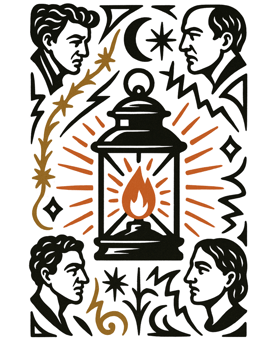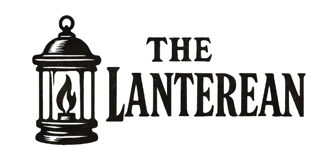Dialogues in the Lantern Light - Lantereanism and the Philosophers Before Us
A reflective journey through the legacy of Kierkegaard, Nietzsche, Camus, and Kant, exploring how their philosophies echo through the core of Lantereanism. This post examines the tension between past and present, belief and reason, and how we carry forward their fire, not in worship, but in Becoming.
The Lanterean
6/20/20253 min read


Lantereanism was not born out of rebellion alone. It emerged from a long conversation with those who came before us, those who struggled with meaning, selfhood, ethics, and doubt. Ours is not a solitary flame, but one sparked by centuries of thought. In every Lanterean circle, the echoes of past philosophers hum quietly beneath our voices.
Their questions were not the same as ours. Their answers would not always satisfy us. But they walked toward the unknown with courage. And for that, we honor them.
We walk now in the dark with a lantern. But it was they who first lit the path.
Søren Kierkegaard
Among them stands Søren Kierkegaard, who demanded that truth be lived rather than merely believed. He understood that Becoming is not peaceful. It is trembling. To him, a person must confront the absurd and leap, not with reason, but with faith. He saw no redemption in careful ethics or shared philosophies unless they were grounded in a passionate encounter with the divine.
His warnings still ring in the Lanterean ear. The danger of the crowd. The seduction of detached reflection. The risk of becoming ethical without becoming transformed.
Yet Lantereanism does not meet Kierkegaard with resistance, but with reverence of a different kind. We do not leap into heaven, but into the finite mystery of this life. We do not seek absolutes above, but possibilities within. We carry forward his seriousness, his call to authenticity, his suspicion of comfort. But where he clung to God, we embrace the unknown and still choose meaning.
Friedrich Nietzsche
And then Nietzsche, the iconoclast, appears like a lightning strike.
He declared God dead and demanded that we stand accountable for what comes next. He feared that, without the scaffolding of religion, humanity would drift into moral mimicry, preserving the shadow of virtue while discarding its divine source. He sought a new kind of person: self-creating, uncompromising, unafraid.
In his eyes, many post-religious attempts at ethics were cowardice dressed as civility. He would sniff at any philosophy that dared to speak of compassion or shared values, suspecting it of smuggling old gods in under new names.
But Lantereanism does not flinch. We do not echo religious dogma. We dismantle it. And still, we choose compassion. Not as commandment, but as conviction. Not as moral law, but as relational depth. We do not exalt the self over others, but invite each person to author themselves in community. Our circles are not herds. They are vessels of shared Becoming. We are not Nietzsche’s Übermensch. We are his heirs with gentler hands and no interest in domination.
He gave us the fire.
We shaped it into lanterns.
Albert Camus
Where Nietzsche flared, Camus smoldered. Albert Camus stood quietly in the ruins of faith and asked: What now?
He refused both divine illusion and cynical surrender. The absurd, to him, was not a tragedy but a condition, a truth to be lived with dignity. He did not seek to overcome meaninglessness with belief. He embraced it, and still found beauty. He chose rebellion, solidarity, and life.
If any voice from the past walks closest to the Lanterean circle, it is his.
We share his refusal of false hope. We share his devotion to clarity, to tenderness, to a kind of rebellion that is not loud but firm. Where Camus found his Sisyphus, we find our lantern-bearers, those who push forward not because the task will end, but because the journey itself is sacred.
Like him, we do not labor alone. Where he stood in the desert, we plant gardens. And we do so without illusions. Without promises. Only the commitment that this life matters, precisely because it is the only one we are sure we have.
Immanuel Kant
Immanuel Kant, though of a colder fire, also joins the conversation. He believed in reason as our moral compass, and in universal principles that could hold us all accountable. His vision of human dignity was clear, formal, and deeply principled.
Lantereanism accepts the spirit of that vision, though not its rigidity.
We believe in the moral autonomy of the individual, but we refuse to sever it from the emotional, contextual, relational fabric of real life. Our ethics are not calculated. They are cultivated. They are not absolute. They are alive. We do not aim to produce perfect moral agents. We seek sincere ones. Thoughtful ones. Fallible and striving and awake.
Kant gave us structure. We offer it breath.
In Conclusion
In the end, Lantereanism is not a final word in philosophy. It is not the answer to every riddle. It is a continuation. A weaving. A response.
We walk forward with lanterns not because we think the darkness can be eliminated, but because we believe it can be navigated. Carefully. Together.
In our gatherings, in our writings, in our reflections, we carry the fire of those who came before. Not to worship it. Not to bury it. But to keep it burning.
So if they were to ask,
“What have you done with our questions?”
We would answer,
“We kept them close. And we asked our own beside them.”
This is Lantereanism.
A circle of Becoming.
A path lit by many hands.
